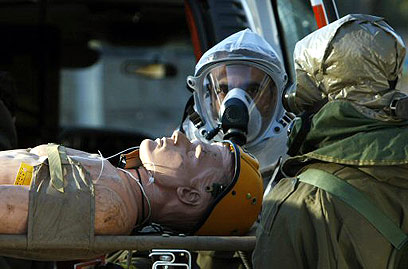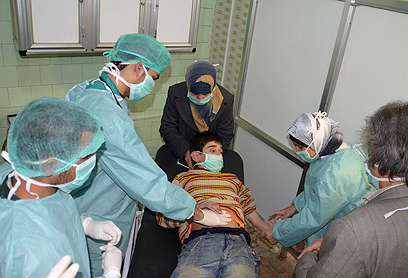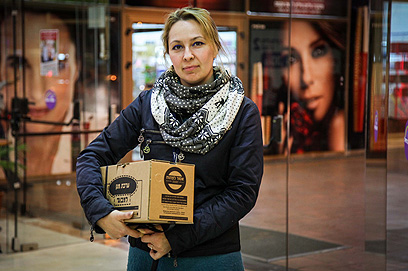


"As of 2010, the preparedness of government offices and authorities against unconventional weapons threat is medium-low," the Home Front Defense Ministry's report states.
Related Stories:
- Number of Israelis updating gas masks nearly triples
- Iran FM condemns chemical weapons use in Syria
- Turkey: Tests confirm chemical weapons used in Syria
The annual report distinguishes between unconventional war and unconventional terrorism, which is "an event in which there is use of chemical, biological or radiological elements to harm and terrorize the population and create pressure and strain on public officials and systems."

Authorities readiness medium-low (Photo: AFP)
As of today there is no change in the level of threat of this kind, but the main difference is in the likelihood of a chemical threat being realized, due to regional instability. "There are many indications about the willingness of regional terrorist organizations to obtain information about unconventional terrorism and get hold of unconventional state reservoirs," the report states.
In regards to the probabilty that unconventional weapons will be used, the report ranks the threats: Chemical terror – high probability and medium severity; biological terror – medium probability and high severity (mainly epidemic); and radiological terror (use of radioactive materials) – medium probability and low severity.

Victim treated for suspected chemical exposure in Syria (Photo: Reuters)
The official report explicitly warns of what the Israeli home front may have to deal with: "The main concern focuses on chemical and biological weapons reservoirs in Syria; loss of control of the regime would bring these materials to a variety of terrorist groups already active in the region. This raises the likelihood of the realization of an unconventional terrorism scenario."
Possible shortage of anti-chemical medicine
The report points to a critical problem that is not at all new and still is not answered: "In terms of distribution of gas masks, the readiness is low. There is a critical gap between the preparedness of the State of Israel against unconventional scenarios and the people's confidence in the State's institutions and guidelines."

Still no solution for the elderly (Photo: Reuters)

Millions have not received gas masks (Photo: Avishag Shaar-Yashuv)
Since the gas masks distribution project began in 2010, 4.6 million kits were handed out, which account for 58% of the population. Of these, 3 million kits were distributed in threatened areas, 77% to institutions and 57% to essential enterprises. "In crisis situations, it would be possible to activate the 'cornerstone' program to distribute the rest of the stock (within) eight days and three additional organization days, and the expected shortage after using the entire budget stands at 2.5 million gas masks. In addition, as of now, there is no proper solution for the elderly."
The relatively positive news, according to the report, is regarding the state of preparedness of relevant emergency and rescue agencies, defined as "primary responders": "They have acquired protective equipment, revised procedures and performed exercises."
The preventive unconventional terror plans were ranked medium on public information, medium-well on public perception and training, and medium-well on exercising. Level of prevention, national crisis management and medical and primary responders systems all ranked at "high level of readiness."
In regards to medicine, the immunization stock was defined "at a good level, yet lower compared to previous years. Medicine stock for chemical events is at a good level, yet due to lack of budgeting will open up a gap towards the end of the year. Antibiotics stock is at a good level, in addition to cooperation on the subject with Germany and the US." In general, the report warns about low levels of awareness among the haredim and Arabs.
Home Front Defense Minister Gilad Erdan said that the report "exactly shows the starting point in which I enter this role. There are places in which an excellent job was done, and places with imparities, lots of them. This report is a roadmap for our activity since it is clear, according to all estimates, that the home front and the public will be in the center of future conflicts, and we saw that very well in recent years."
The Defense Ministry's National Emergency Week, which will be launched in a week and a half, that will address unconventional threats, among other things. According to Erdan, "Israel must accelerate sheltering, create individual-level solutions and assist municipalities to get shelters and overall preparedness. I also intend on working with other strategically important civil agencies and ensure their emergency readiness.
"Especially today, when we discuss the State budget, it is obvious there should be proper allocation of resources, and we should enact the Home Front Law that gives the Home Front Defense Ministry the authority to act, and sometimes force readiness."
- Receive Ynetnews updates
directly to your desktop















